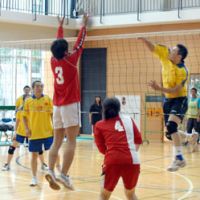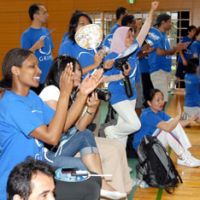Roppongi on Saturday morning tends to be quiet and empty, and pretty much all you see moving there apart from cars and trucks are a few sleep-deprived, hung-over remnants of the Friday night party crowd hobbling toward the station.
But at 9 a.m. on Aug. 1, tensions and energy levels were already high at the Roppongi Junior High School gymnasium — a few minutes' walk from Roppongi Crossing — with nearly 150 people gathered for the second World Amity Games Volleyball Tournament.
Supported by Minato Ward and various embassies located in the ward, and organized mostly by Club Tom, a local nonprofit volleyball club, the tournament was the second WAG event, attracting 12 teams from 20 countries. The first, held in February, featured eight teams.
Nobuo Tanabe, principal of Roppongi Junior High School and chairman of the WAG Executive Committee, said the tournament offers a unique opportunity for foreigners and Japanese alike to socialize through volleyball. "We have a lot of foreigners (living and working) in Minato Ward, but there are few things we have done to promote international exchanges," he said.
Matches were held all day on two courts set up in the gym. A match consisted of two games with 25 points each. At least three of the six players on the court had to be women. But participants' ages, as well as level of experience, appeared to vary considerably.
In the first match, Sparerib, a team made up of Chinese residents in Tokyo, squared off with Minato, which mostly included ward officials. While it was supposed to be a friendly match, cheering got louder and tensions naturally rose. The Sparerib members especially had a few sturdy male players who could jump high and spike hard.
Mark Long, managing director at an international advertising company, came to play for a team named Australia, featuring a mixture of Aussie, Kiwi and Japanese players. Long appeared a bit nervous as he waited for his match, as this would be the first time for him to play volleyball — ever.
"It's a bit frightening because (some people) are serious about it," he said.
Deborah Lee from the Australian and New Zealand Chamber of Commerce and captain of the Australia team, also expressed a bit of shock at the fact that players for so many other teams were fitted with volleyball uniforms, when her own members just wore green or yellow T-shirts to represent Aussie colors.
"We are a little bit taken aback because a lot of players wear uniforms, and they seem very systematic," Lee confessed. "But I think, more than anything, we have the team spirit!"
Some others, meanwhile, pointed to the difficulty of having a few outstanding athletes among a bunch of mediocre players.
"Volleyball is teamwork," said Pavel Prosselkov, an Australian studying at the University of Tokyo who played for the team Roppongi 1.
"That's why competitive players don't like playing in social tournaments (like this one) because they underperform. They feel like they can't do anything."
Prosselkov, who has played competitive volleyball, said he still enjoyed the Roppongi event. "It would be good if we could see this kind of competition happening more often," he said.
Among the participants were a group of elite bureaucrats and central bankers from developing countries studying at the National Graduate Institute for Policy Studies (GRIPS), located in Roppongi. GRIPS had two multinational teams, with players hailing from India, Uganda, Hungary, Cambodia and Macedonia.
GRIPS 2 team leader Asanaliev Marat, a 30-year-old Kyrgyzstan native studying public policy at the graduate institute, said he practices with classmates every Thursday. "You see the Japanese hospitality and an international atmosphere," Marat said when asked about his impression of the event. "Of course, it doesn't go without ambitions, you know, because it's sports."
Nobuatsu Tanaka, a former professional volleyball player and one of the key organizers of the event, said the purpose of the event is to promote friendship at the grassroots level and spread the fun of volleyball. Tanaka spent eight years playing for various professional volleyball leagues across Europe until he came back to Japan three years ago.
"I know how hard it is to adjust to cultural and language differences," he said. "Sports is not something people must do absolutely, but it has its benefits, either as a stress release or an opportunity to express various feelings you cannot express otherwise. Sports should be more enjoyable."
In the end, Kasei-kai, one of the two all-Chinese teams, won the tournament, while Roppongi 2, featuring a mix of Western and Japanese players, came in second. But everyone appeared to have had a good time cheering for friends, meeting new people and socializing with those coming from all walks of life.
"People from different countries, different backgrounds, different (kinds) of volleyball (experience) can join this competition," Prosselkov said.
"That's actually the spirit of Roppongi."






